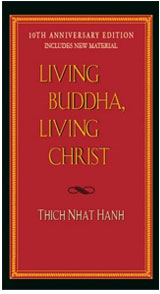Books |
Thich Nhat Hanh: Living Buddha, Living Christ
By
Published: Apr 09, 2019
Category:
Spirituality
Thich Nhat Hanh has no patience for religious doctrine.
For him, the core of the world’s religions is remarkably similar. And poster-simple. “Discussing God is not the best use of our energy,” he writes. “To take good care of yourself and to take good care of living beings and of the environment is the best way to love God.”
Because you have been around the block a few times, you know what an unpopular idea this is.
Oh, not on the surface. In public pronouncements, spiritual leaders hold up brotherhood as an ideal and love as a common thread. But religions are also businesses. And you don’t want the customers doing any comparison shopping. Better to build your brand. And what better way than to state your competitive difference by declaring — sometimes between the lines, sometimes blatantly — that you have an exclusive relationship with God. [To buy “Living Buddha, Living Christ” from Amazon, click here. To buy the Kindle edition of “Living Buddha, Living Christ” from Amazon, click here.]
In this book, Thich Nhat Hanh will have none of that. He’s completely comfortable with competing paths to spiritual wisdom:
To me, religious life is life. I do not see any reason to spend one’s whole life tasting just one kind of fruit. We human beings can be nourished by the best values of many traditions.
And by “life,” he means real life. That is: what we actually do, how we really express our values. Thus, this story from the Vietnam War:
An American soldier standing on the back of a military truck spit on the head of my disciple, a young monk named Nhit Tri. The soldier must have thought we Buddhists were undermining America’s war effort or that my disciple was a communist in disguise. Brother Nhit Tri became so angry that he thought about leaving the monastery and joining the National Liberation Front. Because I had been practicing meditation, I was able to see that everyone in the war was a victim, that the American soldiers who had been sent to Vietnam to bomb, kill, and destroy were also being killed and maimed. I urged Brother Nhit Tri to remember that the G.I. was also a war victim, the victim of a wrong view and a wrong policy, and I urged him to continue his work for peace as a monk. He was able to see that, and he became one of the most active workers in the Buddhist School of Youth for Social Service.
Very hard to do, How does he achieve such balance? First, meditation. Not just to cool yourself out, but, even more, to see your hot buttons — to “recognize and accept the conflicting elements that are within us”.
He also suggests that you poke around in the faiths of others. Again, not just out of a sincere curiosity, but also out of self-interest: “When you touch someone who authentically represents a tradition, you not only touch his or her tradition, you also touch your own.”
So what do you do if you want to live on a higher plane? First, ignore all claims of exclusivity and superiority — as he bluntly writes, “For a Buddhist to be attached to any doctrine, even a Buddhist one, is to betray the Buddha.” But do find a religious community; we practice our faith better when we practice together. Don’t get in the mud with the enemies of peace: “Trying to overcome evil with evil is not the way to make peace.” And, finally, cultivate joy: “Enjoy being alive and you can help the living Christ and the living Buddha continue for a long, long time.”
I write in Spring, the season of rebirth. For Thich Nhat Hanh, it has always been Spring.
To read more about “Thich Nhat Hanh: Essential Writings” on Head Butler, click here.
To read more about “Teachings on Love” on Head Butler, click here.
To read more about “Present Moment Wonderful Moment” on Head Butler, click here.
To read more about “Fragrant Palm Leaves” on Head Butler, click here.


